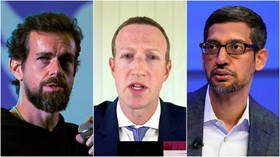A bit too late? Senate committee to grill Google, Facebook & Twitter CEOs on ‘domination & legal liability’ days before election

The heads of major Big Tech firms have agreed to testify to a Senate panel later this month, where they’ll address legal liability for online platforms, privacy and “media domination” just days before the US election.
The CEOs of Google, Twitter and Facebook are set to testify to the Senate’s Commerce Committee on October 28. The tech bigwigs will speak to lawmakers virtually during the hearing, which is scheduled only 6 days before Americans head to the polls to elect the next president.
While the Commerce Committee voted unanimously on Thursday to authorize subpoenas to force the executives to attend the hearing, they reportedly will not be issued formally, as the CEOs have agreed to testify voluntarily.
Facebook’s Mark Zuckerberg, Twitter’s Jack Dorsey, and Google’s Sundar Pichai will each speak at the hearing, the aides said, though so far only Twitter has acknowledged Dorsey’s participation publicly. A Facebook spokesperson told Reuters and CNBC that Zuckerberg would take part, but issued no statement.
.@Jack has voluntarily agreed to testify virtually before the @SenateCommerce Committee on October 28 — less than a week before the US Presidential Election.It must be constructive & focused on what matters most to the American people: how we work together to protect elections
— Twitter Public Policy (@Policy) October 2, 2020
The primary subject of concern at the hearing will be a key legal protection enjoyed by tech platforms – Section 230 of the Communications Decency Act – which shields companies from liability for what users post.
Republicans have long decried what they see as concerted efforts to censor, ban and generally deplatform conservative voices on social media sites, arguing that companies are acting as “publishers” in their decisions to bar certain types of speech and content. Both Facebook and Twitter insist they do not target any particular viewpoint or ideology, however critics argue the companies often apply their policies against “hate speech” and “disinformation” disproportionately to those on the right.
Also on rt.com US Senate committee approves subpoenaing heads of Twitter, FB & Google for hearing on tech firms’ legal immunityTwitter on Friday posted a number of missives pushing back against those charges, saying attempts to “erode” Section 230 are “reactionary and politicized,” while maintaining that accusations of “political bias” are “unsubstantiated.”
The top Democrat on the GOP-chaired committee, Washington Senator Maria Cantwell, initially resisted the subpoenas, but changed her mind after Republicans introduced language stating that the three execs would testify about privacy issues and “media domination” in addition to Section 230.
“I welcome the debate about [Section] 230… Not sure a long and thoughtful process will happen before the election, but I understand my colleagues’ desires here today,” Cantwell said on Thursday, but added “what I don’t want to see is a chilling effect on individuals who are in a process of trying to crack down on hate speech or misinformation about Covid during a pandemic.”
While Republicans hope to press the executives on whether they have attempted to intervene in the 2020 race – by prioritizing certain search results over others, for example, as has previously been documented at Google – the date of the hearing would give less than a week to correct course should they find the companies have indeed tried to put their hand on the scale.
The October 28 hearing will come nearly three months after the CEOs of Facebook, Apple, Amazon and Google were called to testify before the House, where they addressed their companies’ alleged anti-competitive practices, control over online speech and their possible political interests, among other things. The tech kingpins were largely able to deflect the allegations, however, running out the clock with substance-free and filibustering answers to lawmakers.
Also on rt.com Big Tech hearing: Much posturing, no meaningful answers for the American publicLike this story? Share it with a friend!














